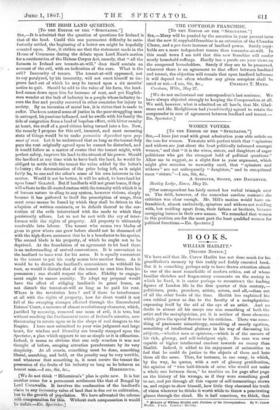THE IRISH LAND QUESTION. [To THE EDITOR OF THE "SPECTATOR."]
SIR,—It is admitted that the question of questions for Ireland is that of the land. Could this one paramount difficulty be satis- factorily settled, the beginning of a better era might be hopefully counted upon. Now, it strikes me that the statement made in the House of Commons daring the debate upon Lord Naas's motion for a continuation of the Habeas Corpus Act, namely, that "all the farmers in Ireland are tenants-at-will," does itself contain an account of the evil, with an indication of the cure. What is the evil? Insecurity of tenure. The tenant-at-will oppressed, not to say paralyzed, by his insecurity, will not exert himself to im- prove land out of which he may be turned upon a six months' notice to quit. Should he add to the value of his farm, the land- lord comes down upon him for increase of rent, and yet English- men wonder at the lack of industry in a people whose industry in- curs the fine and penalty reserved in other countries for injury to society. By an inversion of moral law, it is virtue that is made to suffer. The keen natural sense of justice in the poor struggling man is outraged, his passions inflamed, and he swells with his family the tide of emigration from a land of hopeless effort, with bitter enmity at heart, the stuff of a good citizen being turned into a foe. Now, the remedy I propose for this evil, immoral, and most menacing state of things would be to make possession dependent upon pay- ment of rent. Let it be understood that so long as the tenant duly pays the rent originally agreed upon he cannot be disturbed, and it would follow as a matter of course that the tenant might, with perfect safety, improve his land to the utmost of his power. Should the landlord at any time wish to have back the land, he would be obliged to settle with the tenant the value added by the latter's industry; the determination of the price being left, as it might fairly be, to one and the other's sense of his own interests in the matter. Would it not be better, it will be asked, to have land let upon lease? Granted. But if landlords will not grant leases, if they will adhere to the ill-rooted custom with the tenacity with which it is of human nature to cling to any system, however vicious, simply because it has gathered to itself the prescription of usage, then must some means be found by which they shall be driven to the adoption of written contracts, or in default thereof to the cor- rection of the evils intertwined with the mode to which they persistently adhere. Let us not be met with the cry of inter- ference with the rights of property. All property is ultimately resolvable into labour. The tenant who causes two blades of grass to grow where one grew before should not be shammed off with the high-flown assurance that he is a benefactor to his species. The second blade is his property, of which he ought not to be deprived. At the foundation of an agreement to let land there is an understanding of mutual convenience. It is convenient to the landlord to have rent for his acres. It is equally convenient to the tenant to put his ready means into another form. As it would be to disturb the landlord's convenience to withhold his reut, so would it disturb that of the tenant to oust him from his possession ; one should respect the other. Fidelity to engage- ment ought to ensure security. To adopt my proposal would have the effect of obliging landlords to grant leases, or not disturb the tenant-at-will so long as he paid his rent. Where is the revolution here ? and if there be interference at all with the rights of property, how far short would it not fall of the sweeping changes effected through the Encumbered Estates' Court, a measure of almost revolutionary character, which, justified by necessity, removed one mass of evil, it is true, but without reaching the fundamental cause of Ireland's miseries, now threatening to return upon us in the shape of real dangers to the Empire. I have now submitted to your wise judgment and large heart, for wisdom and liberality are broadly stamped upon the Spectator, a plan which appears to me as simple as it is efficacious. Indeed, it seems so obvious that one only wonders it was not thought of before, escaping attention peradventure by its very simplicity. At all events, something must be done, something liberal, searching, and bold, or the penalty may be very terrible, and whatever that something is, it must secure the tenant the possession of the fruits of his industry so long as he behaves an
[We do not think " Hibemicus's" plan is quite new. It is but another name for a permanent settlement like that of Bengal by Lord Cornwallis. It involves the confiscation of the landlord's claim to any increasing value of land that is due not to cultivation, but to the growth of population. We have advocated the scheme with compensation for this. Without such compensation it would be unfair.—ED. Spectator.]






























 Previous page
Previous page